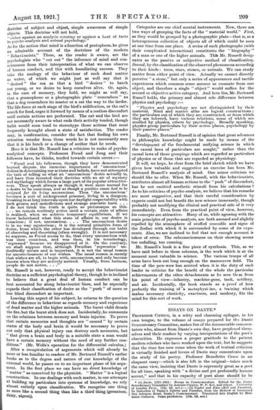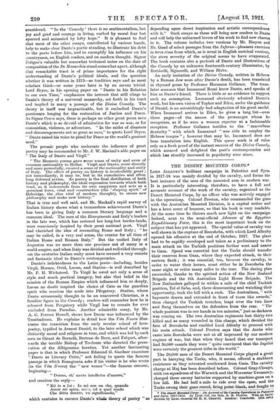ESSAYS ON DANTE.*
PROFESSOR Corm), in a witty and charming epilogue, in his own tongue, to the volume of essays prepared for tb3 Dante Sexcentenary Committee, makes fun of the innumerable commen- tators who, almost from Dante's own day, have perplexed them- selves and their readers by varying interpretations of the poet's obscurities. He expresses a proper gratitude to the patient modern scholars who have worked upon the text, but ho suggests that the time has now come when the work of textual criticism is virtually finished and lovers of Dante may concentrate upon the study of his poetry. Professor Benedetto Croce in an eloquent essay—which is also left in the original—takes much the same view, insisting that Dante is supreniely great as a poet for all time, speaking with " a divine and yet profoundly human accent," and that in his capacity of poet alone should he be • (1) Dante, 1321-1921: Essays in Commemoration. Edited for the Dante SexcellCommittee by Antonio Cippleo, W. P. Her, and others. University of London rPnres. (12s. ad. net.)--(2) Tophet and Eden (Hell and l'aradise). In Imitation of Dante's Inferno and Paradiso, from the Hebrew of Immanuel Den Solomon Romi, Dante's Contemporary. Translated Into English by HOD. mane Collanez, Same publishers. [lN. ad. net.]
considered. " In the ' Comedy' there is no sentimentalism, but joy and grief and courage in living, curbed by moral fear but spurred and animated by lofty hope." It is pleasant to find that most of the other essays, contributed by various hands, help to make clear Dante's poetic standing, to illustrate his debt to the poets before him, and to exemplify his influence on his countrymen, on English readers, and on modern thought. Signor Foligno's valuable but somewhat technical notes on the date of
composition of the De Monarchia stand somewhat apart, although that remarkable tract is of prime importance for the right understanding of Dante's political ideals, and the question whether it was written in 1313—as tradition says and as most scholars think—or some years later is by no means trivial. Lord Bryce, in his opening paper on " Dante in his Relation to our own Time," emphasizes the interest that still clings to Dante's theory of a universal monarchy, set forth in his tract and implied in many a passage of the Divine Comedy. The theory in itself was impracticable, but it embodied Dante's passionate longing for the restoration of Justice and Peace. As Signor Croce says, there is perhaps no other great poem save Dante's which is so devoid of admiration for war as war, or for commotion, violence, or adventure. " In the midst of disasters and discouragements not so great as ours," to quote Lord Bryce,
" Dante raised his voice to plead for Peace as the world's greatest need."
The prosaic people who underrate the influence of great poetry may be commended to Mr. J. W. Mackail's able paper on " The Italy of Dante and Virgil."
" The Homeric poems gave some sense of unity and even of common nationality to Hellas. Virgil and Dante, more directly and more powerfully, created a sense of the nationality and unity of Italy. The effect of poetry on history is incalculably great ; not immediately, it may be, but in its cumulative and often long deferred action. As poetry is the final distillation of both history and philosophy, the ideal expression towards which both tend, so it redescends from its own empyrean and acts as a germinal force, vital and constructive (the ` shaping spirit ' of Coleridge, the elan vital of modern thought), to create new philosophy and make new history."
That is true and well said, and Mr. Mackail's rapid survey of Italian history shows what a tremendous achievement Dante's has been in giving Italy a common literary language and a common ideal. The men of the Risorgimento and Italy's leaders in the late war, which has restored her long-lost border-lands,
were consciously inspired by their great national poet. Virgil had cherished the idea of reconciling Rome and Italy ; " he
may be called, in a very real sense, the creator for all time of Italian Rome and Roman Italy." But the unified Italy of Augustus was no more than one province out of many in a world-empire, mad when Italy was divided and redivided through- put the centuries Italian unity must have seemed a very remote and fantastic ideal to Dante's contemporaries.
Dante's indebtedness to the Latin poets—including, besides Virgil, Horace, Ovid, Lucan, and Statius—is well described by Mr. P. H. Wicksteed. To Virgil he owed not only a sense of style and much poetical imagery, but also that belief in the mission of the Roman Empire which influenced him so deeply.
Lucan no doubt inspired the choice of Cato as the guardian spirit who receives the souls into Ptfrgatory. Statius, whom
Dante erroneously thought to be an tuaavowed Christian, is a familiar figure in the Comedy ; readers will remember how he is released from Purgatory while Virgil has to remain for ever excluded from Paradise. Another admirable essay, by Mr. A. G. Ferrers Howell, shows how Dante was influenced by the Troubadours. Ho explains in detail how the. Vita Nuova illus- trates the transition from the early secular school of love- poetry, typified in Arnaut Daniel, to the later school which was distinctly moral and religious in tone, and which was led by such men as Giraut de Bornelh, Bertran de Born, and Folquet, after- wards the terrible Bishop of Toulouse who directed the perse- cution of the Albigensian heretics. Yet another fascinating paper is that in which Professor Edmund G. Gardner examines " Dante as Literary Critic," not failing to quote the famous passage in which Bonagiunta asks if his visitor is he who wrote (in the Vita Nueva) the " new verses "—the famous canzone, beginning-
" Donne, eh' avete intelletto d'amore," and receives the reply- " Ed io a lui Io mi son un che, quando Amor mi apira, noto, ed a quel mode Che ditty dentro, vo signifloando,"
which contains in essence Dante's whale theory of poetry " as
•
depending upon direct inspiration and artistic correspondence with it." Such essays as these will bring new readers to Dante and will help the unlearned lovers of his work to find new charms in it. The volume includes two versions by Mr. Binyon and Mr. Goad of select passages from the Inferno—pleasant exercises in terza rime from which, as is usual in English metrical versions, the stern severity of the original seems to have evaporated. The book contains also a portrait of Dante and illustrations of the Comedy by an unknown fourteenth-century illuminator, by Botticelli, Signorelli, and William Blake.
An early imitation of the Divine Comedy, written in Hebrew by a Roman Jew soon after Dante's death, has been translated in rhymed prose by Professor Hermann Gollancz. The trans- lator assumes that Immanuel Romi knew Dante, and speaks of him as Dante's friend. There is little or no evidence to support such an assumption. Immanuel obviously admired Dante's work, but his own vision of Tophet and Eden, under the guidance of Daniel, is an astonishingly bad adaptation of his great model. When Immanuel arrives in Eden, he gives a long list—over three pages—of the names of the personages whom he recognizes, a9 if he were a woman reporter at a fashionable reception. Professor Gollancz testifies to the " marvellous dexterity " with which Immanuel " was able to employ the Hebrew tongue " ; however that may be, Immanuel does not bear translation into English. This queer work is of value only as a fresh proof of the instant success of the Divine Comedy, which amazed and delighted the poet's contemporaries and which has steadily increased in popularity ever since.



































 Previous page
Previous page